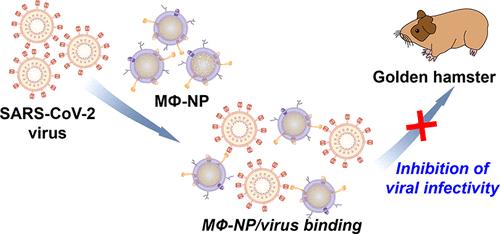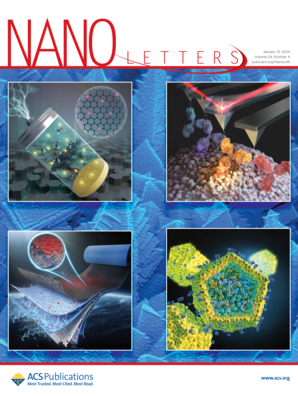细胞纳米颗粒治疗体内冠状病毒感染
IF 9.6
1区 材料科学
Q1 CHEMISTRY, MULTIDISCIPLINARY
引用次数: 0
摘要
细胞纳米粒子(CNPs)是指涂有天然细胞膜的纳米粒子,具有中和病原体的前景。在这里,我们利用 CNPs 作为医疗对策,在动物模型中对抗 SARS-CoV-2 变体的感染。CNPs 由涂有人类巨噬细胞浆膜的聚合物核心组成。由此产生的纳米颗粒(MΦ-NPs)可作为宿主细胞诱饵拦截 SARS-CoV-2 并阻止其进入细胞,从而抑制病毒的后续感染。我们的研究结果表明,MΦ-NPs 能以剂量依赖的方式与 SARS-CoV-2 变体的尖峰蛋白结合,抑制活病毒的感染性。在感染了 SARS-CoV-2 变体的仓鼠身上,MΦ-NPs 能显著减少肺部的病毒负荷,证明了其在体内抑制病毒感染的有效性。此外,MΦ-NPs 主要被肺泡巨噬细胞吸收,不会引起明显的不良反应。鉴于巨噬细胞在病毒感染中的关键作用,MΦ-NPs 为应对新出现的病毒威胁提供了一种前景广阔的方法。本文章由计算机程序翻译,如有差异,请以英文原文为准。

Cellular Nanoparticles Treat Coronavirus Infection in Vivo
Cellular nanoparticles (CNPs), which refer to nanoparticles coated with natural cell membranes, are promising for neutralizing pathological agents. Here, we use CNPs as a medical countermeasure against the infection of SARS-CoV-2 variants in an animal model. CNPs comprise polymeric cores coated with the plasma membranes of human macrophages. The resulting nanoparticles (MΦ-NPs) act as host cell decoys to intercept SARS-CoV-2 and block its cellular entry, thus inhibiting subsequent viral infection. Our findings indicate that MΦ-NPs bind to the spike proteins of SARS-CoV-2 variants in a dose-dependent manner and inhibit the infectivity of live viruses. In hamsters infected with SARS-CoV-2 variants, MΦ-NPs significantly reduce the viral burden in the lungs, demonstrating their effectiveness in inhibiting viral infectivity in vivo. Furthermore, MΦ-NPs are primarily taken up by alveolar macrophages without inducing noticeable adverse effects. Given the crucial role of macrophages in viral infections, MΦ-NPs present a promising approach to combating emerging viral threats.
求助全文
通过发布文献求助,成功后即可免费获取论文全文。
去求助
来源期刊

Nano Letters
工程技术-材料科学:综合
CiteScore
16.80
自引率
2.80%
发文量
1182
审稿时长
1.4 months
期刊介绍:
Nano Letters serves as a dynamic platform for promptly disseminating original results in fundamental, applied, and emerging research across all facets of nanoscience and nanotechnology. A pivotal criterion for inclusion within Nano Letters is the convergence of at least two different areas or disciplines, ensuring a rich interdisciplinary scope. The journal is dedicated to fostering exploration in diverse areas, including:
- Experimental and theoretical findings on physical, chemical, and biological phenomena at the nanoscale
- Synthesis, characterization, and processing of organic, inorganic, polymer, and hybrid nanomaterials through physical, chemical, and biological methodologies
- Modeling and simulation of synthetic, assembly, and interaction processes
- Realization of integrated nanostructures and nano-engineered devices exhibiting advanced performance
- Applications of nanoscale materials in living and environmental systems
Nano Letters is committed to advancing and showcasing groundbreaking research that intersects various domains, fostering innovation and collaboration in the ever-evolving field of nanoscience and nanotechnology.
 求助内容:
求助内容: 应助结果提醒方式:
应助结果提醒方式:


